The AnandTech Coffee Lake Review: Initial Numbers on the Core i7-8700K and Core i5-8400
by Ian Cutress on October 5, 2017 9:00 AM EST- Posted in
- CPUs
- Intel
- Core i5
- Core i7
- Core i3
- 14nm
- Coffee Lake
- 14++
- Hex-Core
- Hyperthreading
Benchmarking Performance: CPU Encoding Tests
One of the interesting elements on modern processors is encoding performance. This includes encryption/decryption, as well as video transcoding from one video format to another. In the encrypt/decrypt scenario, this remains pertinent to on-the-fly encryption of sensitive data - a process by which more modern devices are leaning to for software security. Video transcoding as a tool to adjust the quality, file size and resolution of a video file has boomed in recent years, such as providing the optimum video for devices before consumption, or for game streamers who are wanting to upload the output from their video camera in real-time. As we move into live 3D video, this task will only get more strenuous, and it turns out that the performance of certain algorithms is a function of the input/output of the content.
All of our benchmark results can also be found in our benchmark engine, Bench.
7-Zip 9.2: link
One of the freeware compression tools that offers good scaling performance between processors is 7-Zip. It runs under an open-source licence, is fast, and easy to use tool for power users. We run the benchmark mode via the command line for four loops and take the output score.
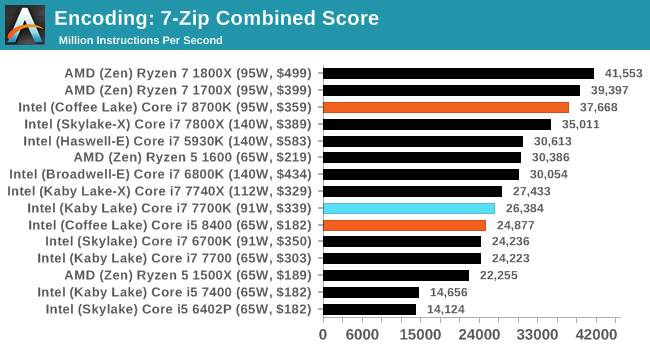
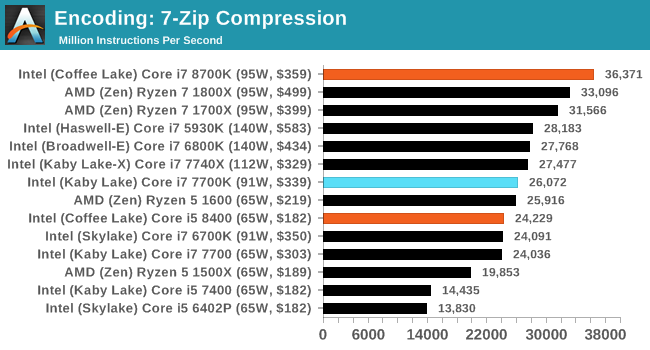
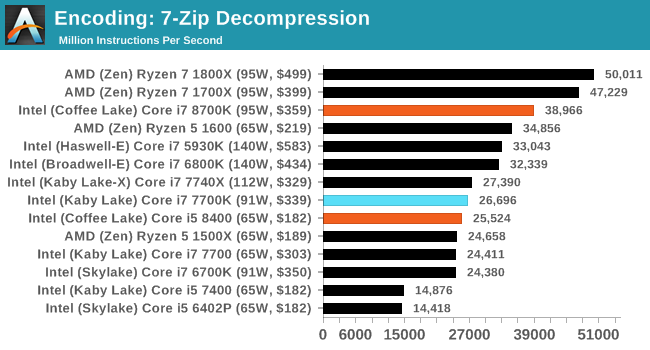
WinRAR 5.40: link
For the 2017 test suite, we move to the latest version of WinRAR in our compression test. WinRAR in some quarters is more user friendly that 7-Zip, hence its inclusion. Rather than use a benchmark mode as we did with 7-Zip, here we take a set of files representative of a generic stack (33 video files in 1.37 GB, 2834 smaller website files in 370 folders in 150 MB) of compressible and incompressible formats. The results shown are the time taken to encode the file. Due to DRAM caching, we run the test 10 times and take the average of the last five runs when the benchmark is in a steady state.
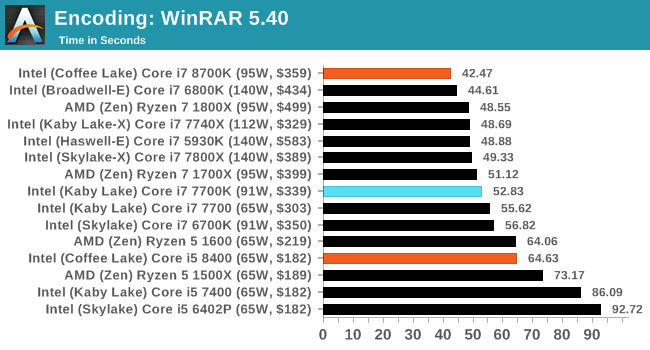
AES Encoding
Algorithms using AES coding have spread far and wide as a ubiquitous tool for encryption. Again, this is another CPU limited test, and modern CPUs have special AES pathways to accelerate their performance. We often see scaling in both frequency and cores with this benchmark. We use the latest version of TrueCrypt and run its benchmark mode over 1GB of in-DRAM data. Results shown are the GB/s average of encryption and decryption.
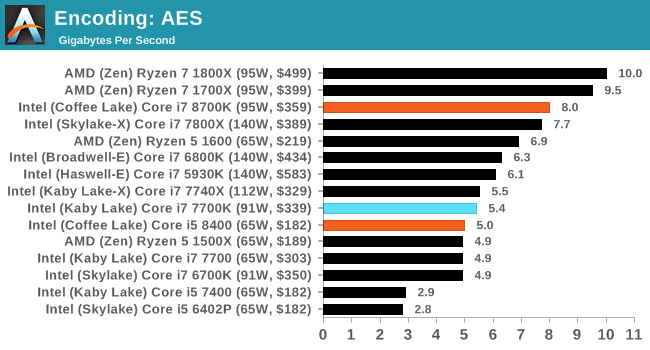
HandBrake v1.0.2 H264 and HEVC: link
As mentioned above, video transcoding (both encode and decode) is a hot topic in performance metrics as more and more content is being created. First consideration is the standard in which the video is encoded, which can be lossless or lossy, trade performance for file-size, trade quality for file-size, or all of the above can increase encoding rates to help accelerate decoding rates. Alongside Google's favorite codec, VP9, there are two others that are taking hold: H264, the older codec, is practically everywhere and is designed to be optimized for 1080p video, and HEVC (or H265) that is aimed to provide the same quality as H264 but at a lower file-size (or better quality for the same size). HEVC is important as 4K is streamed over the air, meaning less bits need to be transferred for the same quality content.
Handbrake is a favored tool for transcoding, and so our test regime takes care of three areas.
Low Quality/Resolution H264: Here we transcode a 640x266 H264 rip of a 2 hour film, and change the encoding from Main profile to High profile, using the very-fast preset.
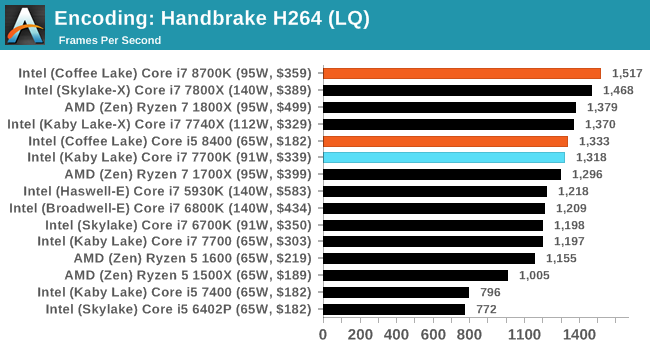
High Quality/Resolution H264: A similar test, but this time we take a ten-minute double 4K (3840x4320) file running at 60 Hz and transcode from Main to High, using the very-fast preset.
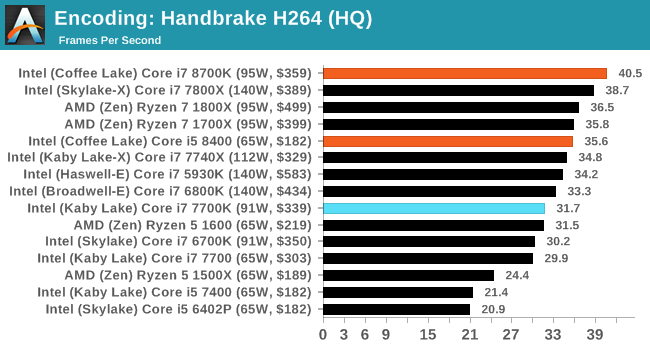
HEVC Test: Using the same video in HQ, we change the resolution and codec of the original video from 4K60 in H264 into 4K60 HEVC.
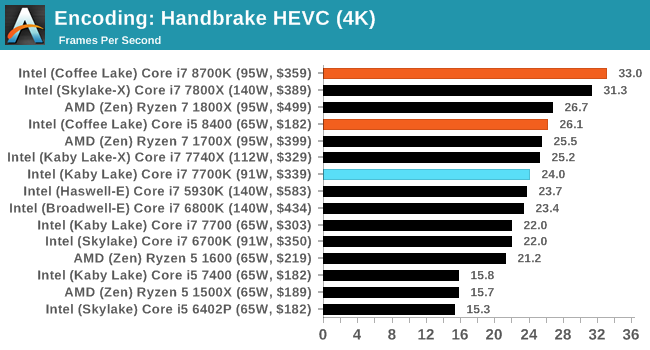










222 Comments
View All Comments
mapesdhs - Monday, October 9, 2017 - link
I'm not sure. :D It's certainly annoying though. Worst part is searching for anything and then changing the list order to cheapest first, what a mess...SunnyNW - Thursday, October 5, 2017 - link
"That changes today."Anyone else read that and think that it is something we should have been reading ages ago?
Consumer technology is progressing slower than many expected and I feel the same way. Nonetheless I can't help but envision a Very near future where I'll be coming back and reading this article and being depressed at this level of technology all the while on my future monolithic many thousand core 3D processor ;)
KAlmquist - Friday, October 6, 2017 - link
Yes. A year ago this would have been an exciting development. Now it's just Intel remaining competitive against AMD's offerings.Valcoma - Thursday, October 5, 2017 - link
"The Core i5-8400 ($182) and Core i3-8350K ($169) sit near the Ryzen 5 1500X ($189) and the Ryzen 5 1400 ($169) respectively. Both the AMD parts are six cores and twelve threads, up against the 6C/6T Core i5 and the 4C/4T Core i3. The difference between the Ryzen 4 1400 and the Core i3-8350K would be interesting, given the extreme thread deficit between the two."Those AMD parts are 4 cores, 8 threads.
Ian Cutress - Thursday, October 5, 2017 - link
You're right, had a brain spasm while writing that bit. Updated.kpb321 - Thursday, October 5, 2017 - link
Still off"The difference between the Ryzen 5 1500X and the Core i3-8350K would be interesting, given the extreme thread deficit (12 threads vs 4) between the two."
the 1500X is a 4c8t processor so it effectively has hyper-threading over the i3-8350K while having a lower overclocking ceiling and lower ipc.
Zingam - Saturday, October 7, 2017 - link
Drinking too much Coffee, eh?hansmuff - Thursday, October 5, 2017 - link
Ian, I love the way the gaming benchmarks are listed. So easy to access and much less confusing than drop-downs or arrows. Nice job!Valcoma - Thursday, October 5, 2017 - link
Are you sure that the i5-7400 got 131 FPS average in benchmark 1 - Spine of the Mountain in Rise of the Tomb Raider? Besting all the other vastly superior processors?Looks like a typing error there or something went wrong with your benchmark (lower settings for example on that run).
Ian Cutress - Thursday, October 5, 2017 - link
I've mentioned it in several reviews in the past: RoTR stage 1 is heavily optimized for quad core. Check our Bench results - the top eight CPUs are all 4C/4T. The minute you add threads, the results plummet.https://www.anandtech.com/bench/CPU/1827